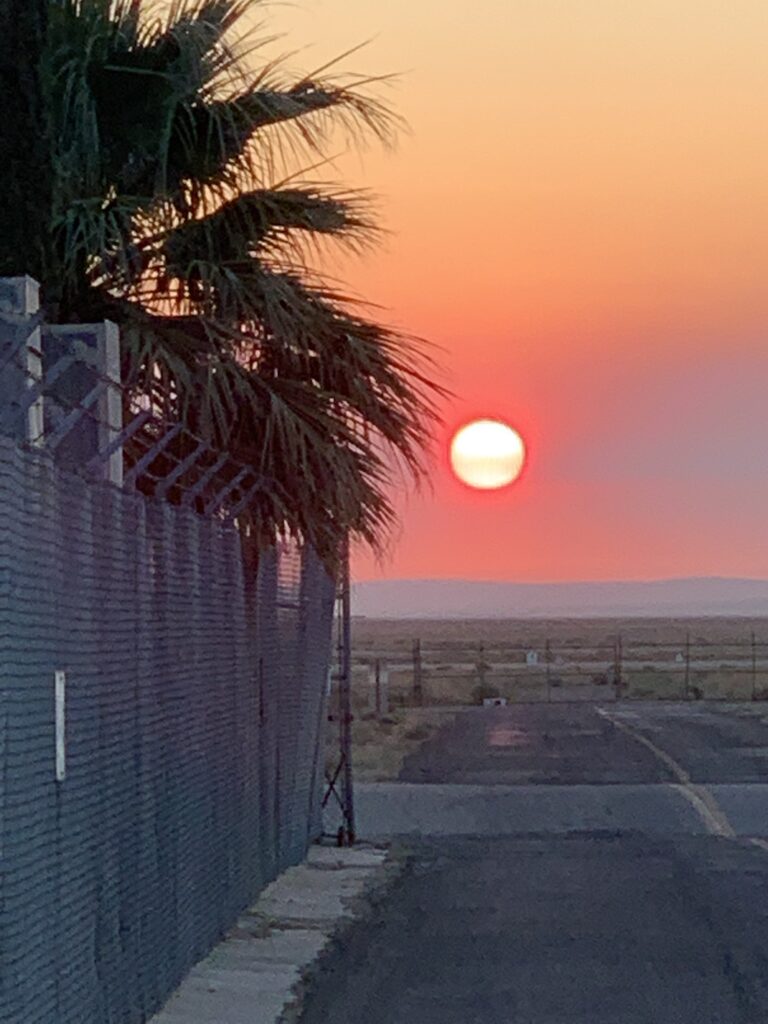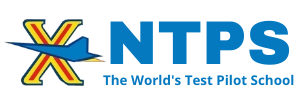NTPS Newsletter: Special Edition!
28 September 2020
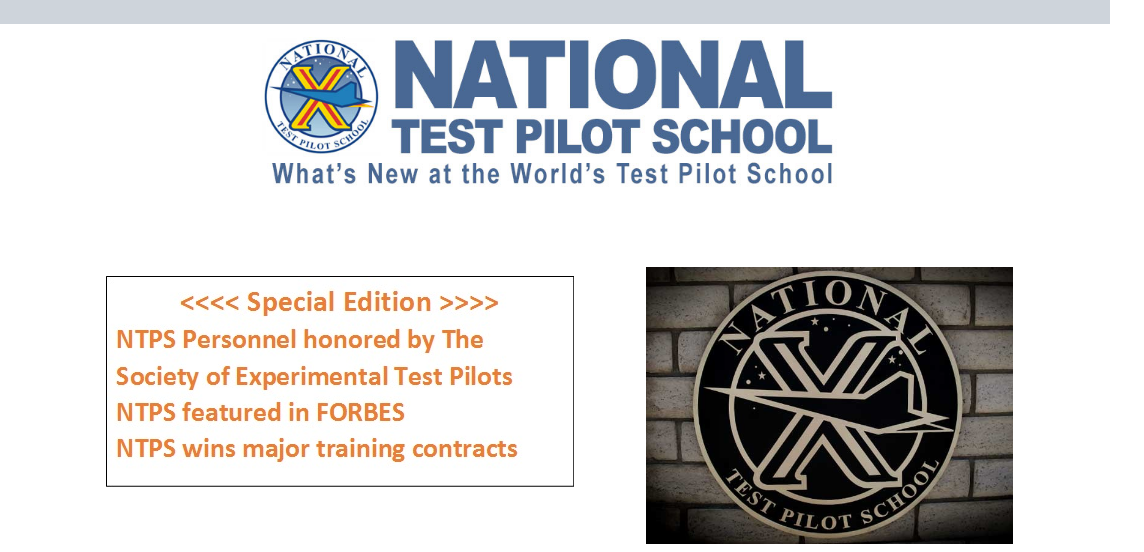
![]()
Hello NTPS Family and Friends and Greetings from Sunny (and Smoky) Mojave!
2020 is a crazy year everywhere and NTPS is no exception; COVID-19 Pandemic causing lots of concern, Election Antics all over the news, Travel difficutlies for some students,Wildfires and Smoke seemingly everywhere, and perhaps craziest of all……
Peterson wins the SETP Doolittle Award!! Well maybe its not so crazy when you think about all the great accomplishments NTPS has achieved in recent years (despite the obvious starting handicap) and the great team that made them happen. While I’m extremely honored to be chosen for the 2020 Doolittle Award, its really a testiment to the great work being done by this amazing team here at NTPS. It all starts with our Board of Trustees and the solid foundation and sage guidance they provide to the school; then you add in the great services that our support staff provides to the students; follow that up with the excellent work that the faculty does working the many quality initiatives (University Accreditation, EASA, ISO 9001, ABET) in addition to providing the best quality academic and flying instruction available; stir in the services provided by our dedicated support contractor; and last but not least factor in the NTPS Management team holdng it all together through thick and thin. A truly winning combination for our students, our customers, and the school. Thanks to everyone associated with NTPS (past and present) for their contributions that resulted in this Doolittle Award. It was truly a team effort, I’m proud of all of you, and I’m honored to accept this award on behalf of us all.
Cheers, Dr. AL
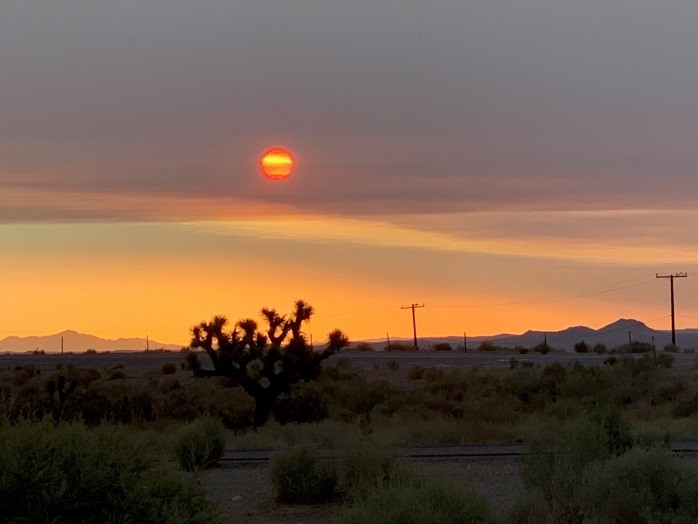

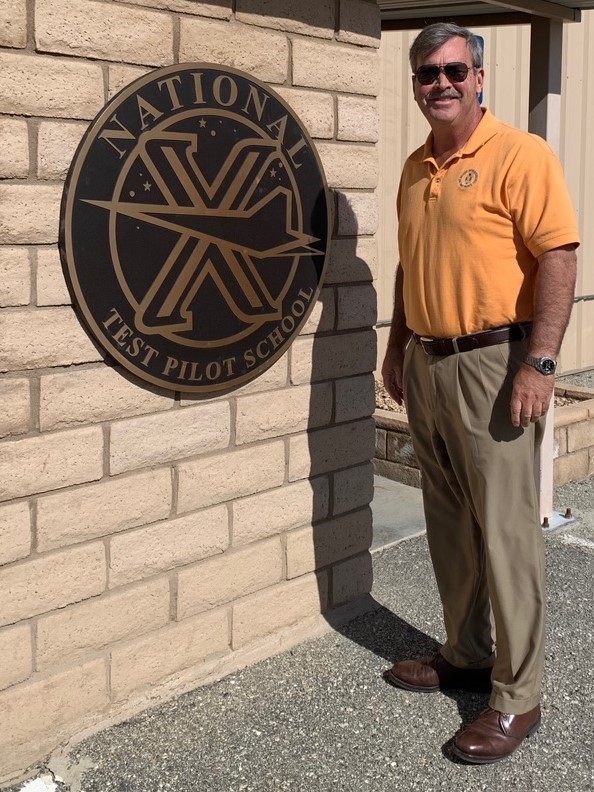
On 25 September 2020, the Society of Experimental Test Pilots announced Dr. Allen L. (AL) Peterson as the recipient of the 2020 Doolittle Award. The James H. Doolittle award was established in 1966 to honor outstanding accomplishment in technical management or engineering achievement in aerospace technology by a member of the Society of Experimental Test Pilots. An excerpt from the award of AL’s accomplishments as the President & CEO of the National Test Pilot School for the past decade reads: Dr. Peterson has envisioned and successfully directed initiatives leading NTPS to become the first test pilot school in the world to attain full EASA certification, WSCUC collegiate accreditation, and ISO 9001-2015 certification, thereby positioning NTPS for a successful long term future. Furthermore, Dr. Peterson has integrated outreach to both our technical and local communities into the daily fiber of the school. In short, Dr. Peterson’s leadership and technical management skills have elevated NTPS… to the point where it can be truly called “The World’s Test Pilot School.” Dr Peterson is a Master Army Aviator and Experiemntal Test Pilot with more than 5000 hours in 80+ aircraft, test pilot experience on over 80 flight test programs, a FAA RW/FW/NVG CFI, an EASA Flight Test Instructor, and a Fellow of the Society of Experimental Test Pilots. All here at NTPS congratulate AL for this well-deserved honor!

NTPS has had some significant contract wins as we continue to grow and provide industry leading, top quality training to customers around the world. NTPS was awarded a multi-year contract to provide test pilot and flight test engineer training to the Royal Canadian Air Force (RCAF). This contract will continue the long-standing relationship that NTPS has providing top quality flight test personnel to the RCAF. NTPS was also awarded a multi-year contract to provide Initial and Recurrent Flight Test Training to the Fight Test Pilots and FTEs of the US Federal Aviation Administration (FAA). NTPS was recognized yet again by the FAA as providing quality flight test training to their personnel. Additionally, NTPS has recently been awarded several contracts from the international aerospace community including a multi-year contract with one of the world’s leading OEMs. NTPS customers are telling us that while price is always a top consideration, they recognize that in the end quality is by far the most important factor. One unnamed source stated that “while a lower price from your competitors initially looks attractive, why would you want to take a 20% discount to only get about 60% of the training? The difference in the quality of the training really shows when they get back home.” We couldn’t agree more. NTPS has the most external quality certifications of any test pilot school in the world and also has the past performance to back it up. Just like our training performance, our standards are quite high and we expect our graduates to meet them. There is no easy ride at NTPS, no free pass, but our faculty works hard to help everyone reach their full potential. Come train with us at the World’s Test Pilot School. You’ll realize that Quality really does matter.

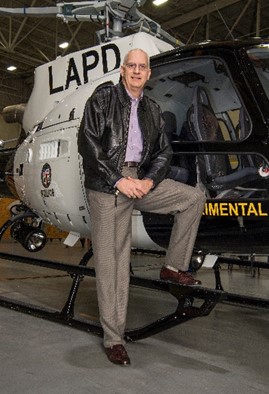
NTPS Board of Directors Member Jeff Trang has been selected by the Society of Experimental Test Pilots to be elevated to Fellow of the Society. Jeff is Vice President of Engineering and Flight Operations for Airbus Helicopters. In this role, he oversees the engineering, certification, and aviation safety departments, as well as all flight test, production, and training operations in Texas, Mississippi, and Canada.
Jeff is a 1983 graduate of Rose-Hulman Institute of Technology, where he earned a bachelor’s degree in electrical engineering and received his commission in the U.S. Army. Upon earning his wings in flight school, Jeff flew operational tours in the AH-1 Cobra and AH-64 Apache. In 1990, Jeff deployed to Kuwait during Operation Desert Shield, after which he was selected to attend the U.S. Naval Test Pilot School. He served the remainder of his military career as a test pilot, serving tours at Edwards AFB, CA and Fort Eustis, VA. He retired as a Lieutenant Colonel in 2004 and was awarded the Legion of Merit (with Oak Leaf). Upon retirement from active duty, Jeff joined the Federal Aviation Administration as a test pilot assigned to the Rotorcraft Directorate in Fort Worth, TX. In addition to his flight test responsibilities, Jeff oversaw the development of new rotorcraft airworthiness standards and policy material; participated in harmonization activities with the European and Canadian aviation authorities; and supported helicopter accident investigations. Jeff holds masters’ degrees in Electrical Engineering (Texas A&M University) and Systems Engineering (SMU). Designated as an Army Master Aviator, Jeff also holds an FAA Airline Transport Pilot rating and has been designated as an FAA Flight Test DER. He has logged more than 5,000 hours in 65 different aircraft.
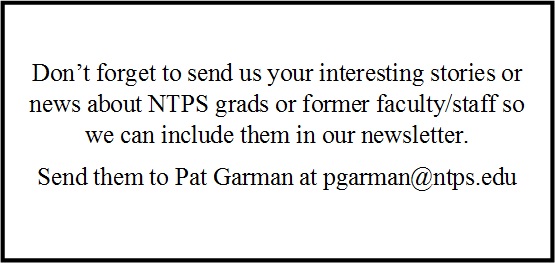
![]()
Air Force Space Command Tapped America’s ‘Other’ Test Pilot School To Start Up A Space Force Flight Test Team
Eric Tegler, Forbes Contributor
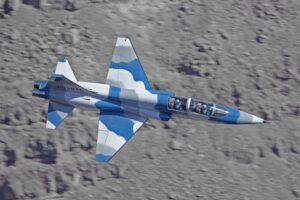
An NTPS Northrop T-38 Talon flies through the well-known “Star Wars” Canyon in Death Valley National Park. Photo Dan Stijovich
Last February, Air Force Reservists from the 14th Test Squadron, which does operational testing and evaluation of space and cyber systems, embarked on a three-week Space Test course with a view to creating a cadre of flight test personnel that can help lead the way for the recently formed Space Force.
You’d expect a developmental/operational flight test course including classroom instruction, formation flights, workload tests, and formation testing to take place at the U.S. Air Force Test Pilot School at Edwards Air Force Base in California or at the U.S. Naval Test Pilot School at Naval Air Station Patuxent River, Maryland. Instead, the Air Force chose to send students to a civilian program at the National Test Pilot School (NTPS).
Allen Peterson, president and CEO of NTPS (and a fixed wing/rotary wing test pilot), explained that the Air Force asked NTPS to hold one of its three-week short-course introduction to space flight testing classes for a class of 12 students from Space Command and other organizations because it didn’t have the additional capacity to offer instruction. A second class is slated to start next week.
In an Air Force press release, Major, Jason Riberdy, Space Test Flight A flight commander from the 14th TS said that, “With the possibility of Space Command going into Space Force, we’re trying to look at new ways of approaching testing, we want to incorporate other avenues in the way that testing has been done. Part of our goal was also to create a cadre of personnel that can help lead the way for Space Force.”
Located about 20 miles northwest of Edwards, NTPS is based at the Mojave Air and Space Port, a place it has called home since 1981. Civilian test pilot schools are rare and only a few are considered on par with military test pilot schools. NTPS is one of them and while most U.S. test pilots and flight test engineers attend the Air Force or Navy schools, there are notable exceptions.
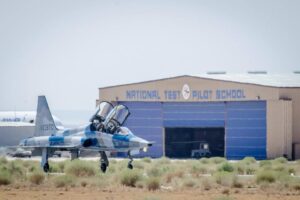
NTPS’ T-38 is one of a fleet of approximately 20 aircraft owned by the civilian test pilot school at Mojave, CA. NATIONAL TEST PILOT SCHOOL
John Rucci, a former Marine CH-53E helicopter pilot and current senior experimental test pilot with Sikorsky’s CH-53K program, is an NTPS graduate. NTPS also has former military test pilots on its instructor staff including Andy Edgell, a Naval Test Pilot School graduate and former F-35 Developmental Test Pilot, Instructor Pilot and Flight Examiner at the F-35 Integrated Test Force, NAS Patuxent River.
A Testing Business
While Britain’s Empire Test Pilot School (established during WWII) was the first of its kind in the world, NTPS was the first civilian test pilot school. Today, it finds itself in competition with national military schools and others which straddle the public/private sectors.
Peterson says that Empire Test Pilot School is his biggest non-governmental competitor. It’s a surprising claim for those unaware that the U.K.’s military test pilot school has for years been managed by British defense contractor, QinetiQ. The company controls major portions of the British training, test and evaluation establishment and according to Peterson, receives $100 million from the U.K. government to manage Empire and other organizations.
Empire’s quasi-private status could put it on a level playing field with NTPS but Peterson points out that it enjoys decades-old grandfathered agreements with the U.S. Naval Test Pilot School among others. Despite NTPS’ standing and domestic origins the agreements “give our competitor advantages that we don’t have,” Peterson says.
A similar situation exists with Canada’s International Test Pilot School in London, Ontario. Originally launched in Britain in 1986, the privately run school receives significant Canadian public funding according to Peterson. NTPS also competes with the French test pilot school which takes in foreign students as well as the U.S. Air Force and Navy schools which take three to five and 10 foreign students a year respectively. New test pilot schools opening in South Africa, Turkey and China will offer further competition.
The space test flight classes for Space Command are obviously welcome business. The students in these join others from the international test community, both military and private. NTPS offers 12-month “long courses” and “short courses” lasting anywhere from a few days to six weeks for fixed and rotary wing pilots and flight test engineers.
Long course students are typically experienced pilots/engineers who want or need to become top-tier Category One experimental test pilots/flight test engineers. About 10 to 30 students a year come to NTPS for long courses. The bulk come from Europe but NTPS sees steady demand from Pacific-Rim countries and Israel. Demand from China is complicated by geopolitics and the Middle East is still a nascent environment for flight test activity outside Israel.
Nevertheless, Peterson confirms, “We’ve seen a steady increase in demand for those courses over the last two to three years from international students.”
Some 200 to 400 students attend NTPS for short courses. Demand for these has been relatively steady though NTPS’ CEO says U.S. defense budget Sequestration hurt the numbers a couple of years ago. Obviously, Covid-19 has not made 2020 a bumper year. Still, he adds that, “Many international countries and companies can’t afford the full course so they’ll send folks to us to do the short courses.”
That brings up an interesting point. Pricing for test pilot curricula is almost non-existent. Governments and militaries, including ours, don’t advertise costs and the public/private schools are similarly opaque.
But NTPS is a fully accredited school, the only flight test school, it says, to have achieved institutional accreditation like a college or university. Accredited as a graduate school by the WASC Senior College and University Commission (a US Department of Education recognized regional accreditation agency) NTPS is not only educationally vetted – it is required by law to publish pricing for its courses.
“One of the disadvantages of being accredited is that we have to publish our prices like any other university,” Peterson says. “None of our competitors publish any prices.” That potentially gives other schools a pricing, bidding advantage.
For the record, NTPS’ long course for test pilots/flight test engineers costs just under $1 million. Short courses go from $10,000 to in the “high $600,000 range” according to Peterson. Costly though they are, the courses attract a third group of students desiring fully recognized Master of Science degrees in flight testing. These may become more sought after following new requirements by the European Union Safety Agency (EASA) for certification of Category One and Category Two test pilots/engineers.
A large group of older pilots/engineers without EASA recognized certification were grandfathered-in when the agency’s rule came into force in 2014. They are now starting to retire, potentially creating a demand crunch which NTPS will be well positioned to address.
The “Tiger Rush”
NTPS aircraft can use the same 128,000 square nautical mile R-2508 test range/airspace that airplanes/UAVs from nearby Edwards Air Force Base and the Navy’s China Lake weapons testing facility use. When flying through the ranges, they use the same sort of five-letter callsign that military aircraft use.
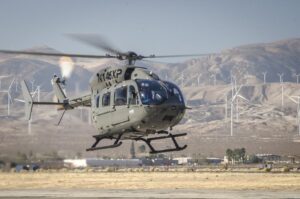
A Eurocopter EC-145 is one a variety of twin and single engine helicopters flown by rotary wing test pilot and flight engineer students. NATIONAL TEST PILOT SCHOOL
In NTPS’ case that callsign is “Tiger” a moniker in use since the school began. A typical day’s flights takeoff at 8:30-9:00 am and again at 10:30 to 11:00 am. Local air traffic controllers call the stream of departures the “Tiger Rush.”
The rush consists of fixed and rotary-wing aircraft from a T-38 Talon trainer and MiG-21 fighter to Bell OH-58 Kiowa Warrior and Eurocopter EC-145 helicopters, turboprop King Air and Merlin transports, and Cessna 182 and Diamond DA-42 general aviation airplanes. As with the premier military flight schools, NTPS students typically have the opportunity to fly 20 or more different single and multi-engine aircraft types.
That diversity is augmented with in-house designed and commercially acquired simulators as well as visits to other nearby simulation facilities. NTPS’ location at Mojave also puts it beside private sector test and innovation from neighbors Virgin Galactic, Scaled Composites, Stratolaunch and others. The pilot and systems test training streams go along with a limited unmanned aircraft curriculum for which there is surprisingly less demand.
While the USAF Test Pilot School does have a complete unmanned pilot/flight engineer course, NTPS only offers portion of its long course or short courses based on the philosophy that the broader test methodology it teaches can apply to manned or unmanned systems.
“You would think there would be more interest but in the unmanned systems arena I think flight test is viewed differently than in the manned systems arena,” Peterson says.
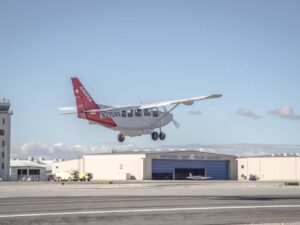
NTPS uses the Australian-built Gippsland GA-8 “Airvan”, a rugged cargo/passenger plane for systems test and engineering courses. A Forward Looking Infrared (FLIR) system resides in the cargo pod. NTPS operates the Airvan in Night Vision Imaging Systems (NVIS) and Electro-Optical/Infrared (EO/IR) systems courses. NATIONAL TEST PILOT SCHOOL
An emphasis on systems-test curricula, which Peterson says NTPS was one of the first to embrace, likely helped it land the Air Force space test students. “Systems test is the preponderance of flight test activity for most of our customers,” Peterson observes.
The 14th TS matures space/cyber system designs and manages risk, tasking an eventual Space Force test and evaluation unit will be asked to focus heavily on. While NTPS doesn’t own or operate the systems that Space Force will use, its test culture and systems mentality are the elements that could underpin the efficacy of the tools the Space Force personnel will rely on.
Stay in touch everybody! We love to hear from everyone in the NTPS family. Make sure you stop by and say hi if you are in the Mojave area! Always something new or improved to see.
